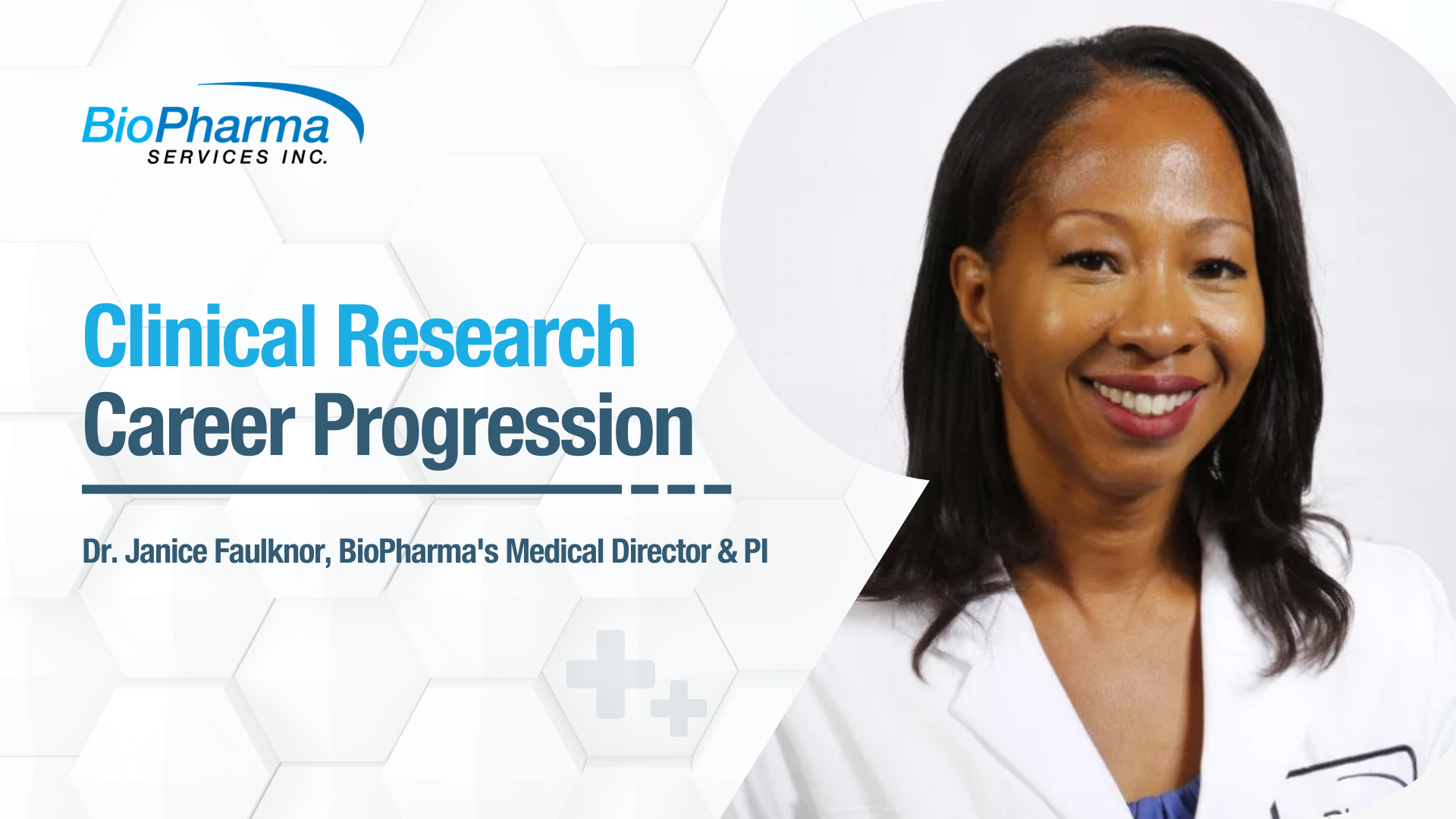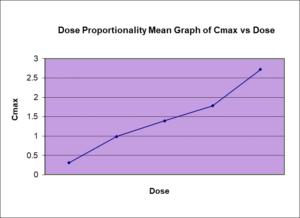SPOTLIGHT ON: Dr. Janice Faulknor – Medical Director and Principal Investigator

Ever since she was a child, Dr. Janice Faulknor knew that she wanted to help people. One of her greatest passions, running, led her to meet a group of accomplished women, one of which inspired her to pursue her dream of becoming a medical doctor. Dr. Faulknor’s commitment to helping others and her entrepreneurial spirit guided her through a successful and diverse career in medicine and clinical research.
Today, as a Medical Director and Principal Investigator (PI) at BioPharma Services, she oversees the safe and effective conduct of clinical trials, contributing significantly to the organization’s success.
Here, Dr. Faulknor shares her insights into clinical drug development and valuable lessons she has learned during her career and how she applies them to her roles at BioPharma.
Can you briefly describe your personal and professional background?
I immigrated to Canada from Jamaica with my parents and older brother when I was two. My parents were deaf educators and we settled in Milton. Interestingly, our family was the first visible minority family in Milton.
I obtained my medical degree from University of Ottawa in 1996. I graduated with a specialty in Family Medicine from McMaster University in 1998 and continue to practice. However, I’ve always had an entrepreneurial spirit and have been willing to try new things.
Throughout my professional career, I gained over 19 years of clinical research experience, focusing on Phase 1 clinical trials. As such, I’ve worked with a wide range of compounds, including central nervous system (CNS), allergy, dementia-focused, and psychedelic compounds, and have managed Human Abuse Potential (HAP) studies and Abuse-Deterrent Assessment programs.
One of the formative experiences of my career was my time at Ventana, the first North American clinical research organization (CRO) performing HAP studies and one of the leaders in studies using CNS compounds. I joined Ventana in 2003 and was fortunate to work with Dr. Edward Sellers, an amazing mentor and expert. We designed and conducted HAP and CNS studies for the eight years I spent there.
Utilizing and building on my experience during my tenure at BioPharma Services, I’ve conducted over 100 Phase 1/HAL trials encompassing a wide range of disease areas and compounds.
What are your professional responsibilities as a medical director and principal investigator at BioPharma?
In my dual role at BioPharma Services, I’m committed to ensuring that our sponsors’ studies are run safely and effectively. As a Medical Director, I am responsible for all safety and medical aspects of BioPharma Services’ operations and supervise the activities of clinical teams. As a Prinicipal Investigator (PI), I oversee clinical trials and ensure that they are conducted safely and in accordance with Good Clinical Practice (GCP).
BioPharma operates with a full-service model, and we effectively and competently support all aspects of our sponsors’ clinical trials. More specifically, we can contribute to protocol design and writing, dose selection, sample collection and pharmacokinetic analysis, trial conduct, data analysis, report writing, publication, and quality assurance and control.
What is your primary focus in your dual roles?
My ultimate priority in all of my activities is paitent/volunteer safety. When I start working with a new compound, I review it from the safety viewpoint and ask myself: “Would I feel comfortable if one of my family members participates in this trial?” Then, I carefully consider the dosing schedule to ensure its safety. Finally, I confirm that all necessary safety stops are integrated into the study protocol to prepare us for any emergencies.
How do you approach patient safety?
At BioPharma Services, we implement a clear strategy that includes a number of steps to guarantee patient safety. The safety assessment begins with reading the investigator brochure and reviewing the preclinical in vivo and in vitro studies to determine what they have taught us.
Next, we clarify any potential uncertainties regarding the study design. We also review the dose and dosing schedule, checking whether a single ascending dose (SAD) or multiple ascending dose (MAD) study is planned and appropriate for the particular trial.
What is your approach specific to Phase 1 clinical trials?
For each new trial, we conduct staff and investigator training to ensure that the knowledge and expectations of all team members are aligned. This comprehensive approach to safety is especially pertinent in the context of the Phase 1 clinical trials we conduct at BioPharma Services, as each study has particular nuances, and vigilance throughout the trial is key.
Even though adverse events may not have occurred in the preclinical studies, we always learn as much as possible about a new compound to prepare for known or unknown adverse events. To summarize, no two study protocols are the same, and therefore, we need to treat each new drug candidate with respect and train on each protocol.
What do you value most about working at BioPharma Services?
BioPharma’s collaborative culture is a wonderful environment to work in. Working with the scientific team allows us to look at a new compound from different angles, enriching our perspectives.
I also enjoy working closely with BioPharma’s research coordinators. We have an incredibly diverse team, including individuals with diverse backgrounds, which makes us a dynamic company. Our team includes many individuals with doctorates. Additionally, we have American, Canadian, and internationally trained medical doctors and scientists.
Another exciting aspect of my job is being involved in all stages of client interactions. I first interact with clients after they’ve had a discussion with our business development unit and want to explore conducting a project with BioPharma Services. After a project is initiated, depending on the needs of each sponsor, I can contribute to all aspects of protocol development, study design, and dosing, based on the safety summary or investigational brochure, to ensure the smooth conduct of the study.
How does your background as a practising physician help you manage your current responsibilities?
I firmly believe that a solid grasp of medicine is critical in clinical research. My experience as a practising physician has strengthened my ability to handle emergencies efficiently and competently, and has taught me to work with indigenous populations. As a physician, I have dealt with numerous emergencies, including in remote northern nursing stations, where I had to handle life-threatening situations solely with a nurse until emergency services could arrive.
In addition, my experience in a group practice setting has helped me learn to collaborate effectively, a prerequisite for working successfully at a CRO. Finally, my expertise in various clinical trial designs and with a number of different compounds, including many CNS trials and HAP studies, has been highly beneficial for my success in my dual role as a Medical Director and Principal Investigator at BioPharma Services.
What challenges do you face when designing clinical trials?
It sometimes feels challenging to optimize the design of a clinical trial in a way that addresses all safety aspects extensively while staying within the framework of its budget. We have to ensure that we are not shortchanging subjects’ safety while also thinking of everything from a company’s and sponsor’s point of view. And in certain trials, the recruitment of study participants may be challenging.
Finally, a balance should be found between optimizing clinic space and the safety of study participants. At BioPharma, we address and overcome these challenges by working as a team.
How are emergencies that might arise during a clinical trial handled?
Any emergency that arises during a clinical trial can be an extreme challenge. Still, BioPharma has designed an efficient strategy to address them safely and effectively if they do occur. Our investigators are trained in advanced cardiovascular life support (ACLS) and have access to a defibrillator and a crash cart at our clinical facilities, similar to a hospital environment. Our staff comprises Emergency physicians and Family physicians and Physician Assistants. We are prepared to handle any situation until emergency services arrive.
I often think of one challenging situation I faced as a PI at Ventana. A subject was dosed with a CNS compound. Weeks after completion of dosing, he presented with psychosis. The laboratory findings revealed a high level of the study compound in the subject’s system. We discovered that he was a poor CYP3A4 metabolizer, which was the reason for the elevated level of the study compound in his blood.
As a result, this particular situation has helped me to formulate a comprehensive differential diagnostic workup when I encounter a patient with an unexpected side effect.
What advice would you give someone interested in pursuing a career at a CRO?
I encourage anyone interested in working at a CRO like BioPharma Services to speak to someone in the industry who understands the many diverse activities and roles in such organizations. Further, reading relevant published literature can help you better understand what to expect and whether a position at a CRO would be a good fit for you. In addition, there are courses that can introduce you to drug development and CRO activities.
How do you achieve a work-life balance? Any hobbies?
As a mom of four, I always try to prioritize time for my family. Working at BioPharma has allowed me to do just that. As for “hobbies,” I love to travel, garden and to try new experiences. I consider myself an “adrenaline junkie”. Running has been a lifelong passion of mine. I was a competitive middle-distance runner until my second year of medical school, and I reached the national level.
BioPharma Services, Inc., a Think Research Corporation and clinical trial services company, is a full-service Contract Clinical Research Organization (CRO) based in Toronto, Canada, specializing in Phase 1 clinical trials 1/2a and Bioequivalence clinical trials for international pharmaceutical companies worldwide. BioPharma conducts clinical research operations from its Canadian facility, with access to healthy volunteers and special populations.



